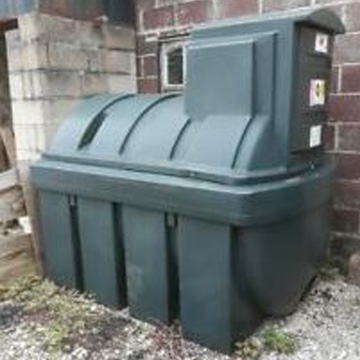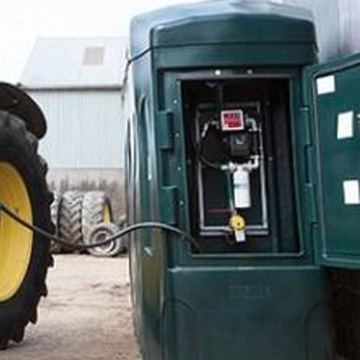Your fuel storage tanks are an essential piece of equipment to keep your farm moving and will require some degree of on-going maintenance in order to remain fit for use and compliant with current regulations.
A failure of your agricultural fuel storage tank leading to a spill of the oil content is very serious and could cause harm to the environment through contamination and pollution. Following an on-going maintenance schedule should reduce the chances of pollution and protect your staff and livestock from harm. As the land owner it is your responsibility to ensure that the fuel storage tanks including any associated pipework are safe and fit for use. A well maintained tank will be less likely to suffer an accidental spill and should remain usable for between 10-15 years.
SSAFO Regulation and the Environment Agency:
One of the most important considerations when storing at least 1500 litres of agricultural fuel such as Diesel on your farm is that you meet the ‘Storing Silage, Slurry and Agricultural Fuel Oil’ regulation. This regulation is comprised of a set of stipulations which must be met in order to safely store agricultural fuel and remain on the right side of the environment agency.
The SSAFO regulation states that a bund must be used as a form of secondary impermeable structure which can hold at least 110% of the capacity of your fuel storage tank or FDA Fuel Depot. The regulations also state that fuel storage tanks must be kept a safe distance away from waterways.
It is important to note though that not all plastic bunded fuel tanks adhere to the SSAFO regulations. Further information on the regulations can be found on the government website.
The Environment Agency can carry out inspections on your fuel storage equipment including tanks and FDA Fuel Depots. If they deem your agricultural fuel storage tanks to be unsafe for use they can ‘serve a notice’ to stop you using the equipment until it is repaired or replaced. Following a regular maintenance schedule can help you to identify and rectify potential problems with your fuel storage system before it is too late and at risk of causing a harmful oil spill.
Familiarise yourself with your agricultural fuel depot (FDA) or plastic storage tank
In an emergency situation such as an oil spill, it pays be to be familiar with your oil system and comfortable with how your agricultural fuel storage tanks work. Spend time getting to know your storage tanks and any pipework or valves as each tank or fuel depot will be slightly different. Familiarising yourself with your storage tank system will also help you to identify any changes which could indicate an oil leak or spot any damage before it becomes a big problem. It is worthwhile spending time checking the following:
- You know how to use the valves on the oil storage tank
If you suffer a leak in the pipework or valves leading from your oil tank, it is important that you know how to stop the oil flow using the isolation valve, to prevent further oil spilling.
- You know the capacity of your fuel storage tank
The amount of oil a storage tank can hold can vary a lot depending on the make and model. An FDA Fuel Depot designed for heavy commercial use can hold up to 9400 litres. The capacity of oil your tank can store should be printed on the tank itself. Your fuel supplier can keep a note of the capacity of your tank on your account as this helps them to estimate the amount you will take if you order a tank fill.
- You know how to operate the oil level monitoring gauge
This is usually a clear tube, which indicated the level of oil in the tank. We recommend that you do not allow the level of oil in the tank to fall below 12” from the bottom to prevent commonly-occurring sludge entering the pipework, which could lead to a boiler breakdown and would require a visit by an engineer to rectify.
Top-tips to help look after your farm’s FDA Fuel Depot or Plastic storage tank:
In general, if your oil storage tank remains in good condition it should last a long time and not require much on-going maintenance. Below are Gleaner’s best practices to ensure your agricultural fuel storage tank is well maintained:
- Inspect your farm fuel storage tank twice a month
We recommend inspecting your agricultural fuel storage tank more frequently than you would a domestic heating oil tank. This is due to the larger capacity of fuel they can hold. It is also beneficial to ensure any problems are picked up early before they lead to a failure of the tank at a time when you need your fuel the most such as sowing and harvest.
Signs of vegetation die-back or wet patches surrounding the tank could be an indication that there is an oil leak and should be investigated by an OFTEC engineer. Read about the warning signs you should be looking for when inspecting your FDA Fuel Depot or plastic tank here.
- Have an OFTEC engineer inspect your agricultural fuel oil storage tank yearly
In addition to twice monthly checks of your oil storage tank, Gleaner would recommend an OFTEC registered engineer completes an inspection of your tank at least once a year. The engineer is fully trained to identify faults or potential dangers with your oil tank and may be able to pick up on something you have missed. Usually a tank inspection is carried out at the same time as an annual oil boiler service. Speak to our boiler service team today for more information on boiler servicing and tank inspections.
- Ensure there is suitable protection for your static outdoor tank or fuel depot:
It is important to consider what protection your static outdoor plastic oil storage tank will require. Environmental dangers such as strong winds, broken or low hanging tree branches, and falling snow or icicles, could all lead to damage being caused to the tank or Fuel depot.
In a farm environment it is advisable to take extra care when choosing the position of your outdoor fuel tank. Avoid locations where the tank could be in danger from vehicles such as driveways and turning circles. It is also advisable to use bollards/barriers to protect the tank from any accidental impacts.
- Ensure your storage tank clearly displays the fuel oil type it holds
It is important to ensure your farms fuel storage tanks clearly display the type of oil they contain. Incorrect or missing labelling could lead to an accidental crossover of fuels. If your agricultural businesses stores different fuels it is important to ensure each tank is correctly and clearly labelled.
- Annual Water Inspections for your FDA Fuel Depot
Our last top-tip would be to have your Fuel Depot tested at least once a year for water build-up. Testing for water at the bottom of your FDA should help prevent your expensive farm equipment from breaking down. Water inspections can be carried out at the same time as tank inspections by a registered OFTEC engineer.
For more information on tank inspections or replacement tanks, or for guidance on maintaining your fuel oil storage tank, contact our boiler maintenance department on 01343 557 435

